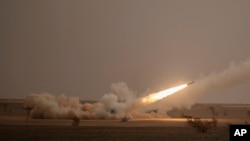Conflict
Ukraine Gets More Rockets

Ukraine said Monday it had received more precision rocket systems from the United States and Germany, adding to a growing arsenal of Western long-range artillery Kyiv says is changing dynamics on the battlefield.
Defense Minister Oleksiy Reznikov tweeted that four more HIMARS rocket launchers from Washington and the first in a batch of German MARS-II systems had arrived in Ukraine.
He thanked his German counterpart Christine Lambrecht, saying "our artillerymen salute our German partners!"
In response to Washington's latest deliveries, Reznikov wrote that he was "grateful" to President Joe Biden and his US counterpart Lloyd Austin for "strengthening" the Ukrainian army.
"We have proven to be smart operators of this weapon. The sound of the #HIMARS volley has become a top hit of this summer at the front lines!" Reznikov wrote.
Reznikov last month asked Washington to send more of the systems, saying Kyiv's forces had used them to destroy around 30 Russian command stations and ammunition depots.
He said that at least 100 of these systems were needed for an effective counter-offensive against Moscow's troops.
So far the United States has agreed to send some 20 HIMARS systems to Ukraine under a major program to equip Kyiv's forces.
He also renewed a call for longer-range ammunition to cut off Russian units from their support.
Washington has hailed as "excellent" the use of HIMARS by the Ukrainian army, highlighting their impact on the battlefield.
But Biden's administration has so far refused to send longer-range ammunition, fearing that Ukraine would strike targets inside Russian territory and potentially expand the war into a direct clash with the West.
The German-provided MLRS MARS II is the third variety of sophisticated rocket-launcher system -- after HIMARS and MLRS M270 -- to be given to Ukraine to help it battle Russia's invasion.
He also renewed a call for longer-range ammunition to cut off Russian units from their support.
See all News Updates of the Day
Former US Ambassador to Syria reacts to al Assad ouster
Syria's former President Bashar al Assad has fled to Russia according to Russian state media. Following his ouster, Syrian rebels have taken control of key cities and forced government forces to surrender. As rebel groups consolidate control, what’s next for Syria? VOA’s Jackson M’vunganyi spoke to former United States Ambassador to Syria Ryan Crocker about the latest developments in the beleaguered country and on how is the United States posed to remain involved there in pursuit of democracy.









